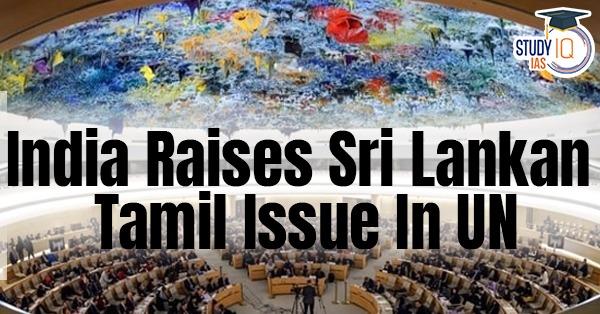Table of Contents
13th Amendment Of Constitution
- The 13th Amendment was passed in 1987 and mandates a measure of power devolution to the provincial councils established to govern the island’s nine provinces.
- This amendment was an outcome of the Indo-Lanka Accord of July 1987, signed by the then Prime Minister Rajiv Gandhi and President J.R. Jayawardene, to resolve Sri Lanka’s ethnic conflict.
13th Amendment of the Constitution: India’s Statement
- India has asked for implementation of the 13th Amendment of the Constitution that delegates powers to Provincial Councils and holding of Provincial Council elections at the earliest.
- India says that Sri Lanka’s best interests lay in building capacity of its citizens and work towards their empowerment, for which devolution of power to the grassroots level is a compulsory.
Sri Lankan Civil War
- Sri Lanka has two major ethnic groups: the majority Buddhist Sinhalese and minority Tamil Hindus. The Tamil population lives majorly in northern and eastern parts of the country.
- After independence, Sri Lanka took some unitary decisions such as taking away citizenship of migrant Tamils and making Sinhala the sole official language. This developed resentment.
- LTTE (Liberation Tigers of Tamil Eelam) was formed in in 1976 with an aim of acquiring a homeland for the Tamils in Sri Lanka.
- Indian intervention: In 1987, Prime Minister Rajiv Gandhi signed the Peace Accord with Sri Lanka and decided to intervene in the situation by sending the Indian Peacekeeping Force (IPKF).
- Significance of 13th Amendment: Until now, the 13th Amendment of the Constitution represents the only constitutional provision on the settlement of the long-pending Tamil question.
- Why is it a contentious issue?: The 13th Amendment carries considerable baggage from the country’s civil war years and was opposed vociferously by both Sinhala nationalist parties and the LTTE.
- This amendment was widely perceived as an imposition by a neighbour (India) wielding hegemonic influence.

India’s Economic Support To Sri Lanka:
- Financial assistance: India has extended nearly $ 4 billion assistance to Sri Lanka but has not made any public comments on the island’s economic choices till now.
- India said that Sri Lanka’s current economic crisis showed the limitations of debt driven economy and the impact it has on the standard of living.
- Apart from International Sovereign Bond holders, Sri Lanka owes significant amount to China, Japan, and India.
- India’s stand at the UN:
- Vote: A resolution on Sri Lanka is likely to face a vote at the Council. Since 2009, India has thrice voted in favour of the U.N. resolution on Sri Lanka and abstained twice from voting.
- Political solution: Irrespective of vote, India has stressed on the need for a political settlement within the framework of a united Sri Lanka, ensuring justice, peace, equality and dignity for the Sri Lankan Tamils.
UN Human Rights Council (UNHRC):
- It is an inter-governmental body within the United Nations framework responsible for strengthening the promotion and protection of human rights around the world.
- It also addresses situations of human rights violations and makes recommendations on them.
- Members: The Council consists of 47 United Nations Member States which are elected by the UN General Assembly.
- Membership:
- The council’s membership is based on equitable geographical distribution. African and Asia-Pacific countries have 13 seats each, Latin American and Caribbean countries have 8 seats, Western European and other countries 7 seats, and Eastern European countries 6 seats.
- The members have a term of three years and are not eligible for immediate re-election after serving two consecutive terms.

Stats IQ
Index Of Industrial Production (Iip)
- India’s industrial output grew by just 2.4% in July from 12.7% in June, with output levels dropping 2.75% month-on-month.
- Manufacturing sector’s output grew 3.2 per cent in July 2022.
- Power generation increased 2.3 per cent.
- Mining output contracted 3.3 per cent.
- It is released by the National Statistical Office (NSO), Ministry of Statistics and Programme Implementation.
- Base Year for IIP is 2011-2012.





















 WhatsApp
WhatsApp